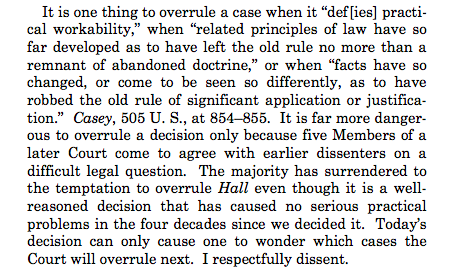Supreme Court Justice Stephen Breyer sounded the alarm about the court’s conservative majority’s eagerness to overturn decades-old precedent in a dissent to a 5-4 decision where the court reversed a 1979 ruling regarding state sovereignty.
Breyer’s statement was widely interpreted to be a warning about Roe v. Wade, given that he teed up his warning with a reference to a 1992 abortion case that upheld the 1973 landmark decision enshrining the constitutional right to abortion.
“Today’s decision can only cause one to wonder which cases the Court will overrule next,” Breyer said, after quoting the decision 1992 Planned Parenthood v. Casey.

Breyer’s dissent was in a lower-profile case not having to do with abortion, but rather the question of whether a state can face a private lawsuit in another state’s court without its consent. The conservative justices on Monday overturned the 1979 decision in Nevada v. Hall that had allowed such lawsuits. The court’s other liberal justices joined Breyer’s dissent.
Last term, the conservative justices also overturned a longstanding decision allowing public unions to extract fees from non-union members.
Since President Trump was able to solidify an abortion-hostile conservative majority on the courts — by replacing Justice Anthony Kennedy, who was at times sympathetic to abortion rights, with Justice Brett Kavanaugh — states have moved quickly to pass anti-abortion laws that could serve as the test cases to rolling back Roe.
The most recent is a bill signed by Georgia Gov. Brian Kemp (R) last week banning most abortions after a fetus’ heart beat is detected — which is usually around six weeks into a pregnancy. There are other anti-abortion laws already being challenged in court in cases that will soon be at the Supreme Court’s doorstep as well as one from Indiana that the court is already considering whether it should take up.
Writing for the majority Monday in the state sovereignty case, which was called Franchise Tax Board of California v. Hyatt, Justice Clarence Thomas included his own hints that the conservatives were ready to cast certain court precedents aside. The legal term for the posturing towards upholding the Supreme Court’s previous precedent is stare decisis.
“With the historical record and precedent against him, Hyatt defends Hall on the basis of stare decisis,” Thomas wrote, referring to the party in the case that was arguing for the precedent to be upheld.
“But stare decisis is ‘not an inexorable command,'” he continued, “and we have held that it is ‘at its weakest when we interpret the Constitution because our interpretation can be altered only by constitutional amendment.'”







When Plessy v. Ferguson is reinstituted it should make for interesting times.
One thing the right has been transparent about is the plan to overturn settled law. It’s a feature, not a bug of the system.
With the passing of every week I get more angry; and at the same time more sad with the thought that this will not end well. This is not so much rational as the envisioning of a trajectory toward national misery that now seems unavoidable to me.
ETA 1.1 million folks lost their health insurance this year.
I’m curious about this particular case though. Suing a state in another state’s courts doesn’t seem to make sense to me.
Apparently Conservatives don’t know what the word means.